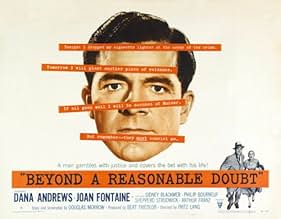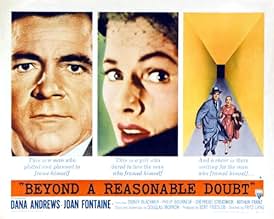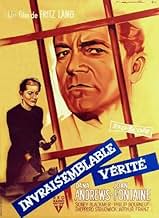IMDb-BEWERTUNG
6,9/10
6285
IHRE BEWERTUNG
Füge eine Handlung in deiner Sprache hinzuA novelist aided by his future father-in-law conspires to frame himself for the murder of a burlesque dancer as part of an effort to ban capital punishment.A novelist aided by his future father-in-law conspires to frame himself for the murder of a burlesque dancer as part of an effort to ban capital punishment.A novelist aided by his future father-in-law conspires to frame himself for the murder of a burlesque dancer as part of an effort to ban capital punishment.
- Auszeichnungen
- 1 Nominierung insgesamt
William F. Leicester
- Charlie Miller
- (as William Lester)
Empfohlene Bewertungen
"Beyond a Reasonable Doubt" is a curious film - it has the look and feel of a B movie and two stars who had seen better days - Dana Andrews and Joan Fontaine - yet it's a good script directed by Fritz Lang. A novelist (Andrews) and his future father-in-law, a newspaper magnet (Sidney Blackmer) work together to prove that the death penalty isn't justified by framing Andrews for a recent murder.
I thought the story excellent with some exciting twists, though the whole movie has an underplayed (not to mention inexpensive) feeling to it. Fontaine seemed a little old for her role. However, she does a good job as a sophisticate, and Andrews is good as well. Barbara Nichols does a fine job in a typical supporting role for her.
Lang returned to Germany after this film, his last in America. It's an effective plot but one wishes the man who made Metropolis and so many other fine films was given more of a budget for his swansong.
I thought the story excellent with some exciting twists, though the whole movie has an underplayed (not to mention inexpensive) feeling to it. Fontaine seemed a little old for her role. However, she does a good job as a sophisticate, and Andrews is good as well. Barbara Nichols does a fine job in a typical supporting role for her.
Lang returned to Germany after this film, his last in America. It's an effective plot but one wishes the man who made Metropolis and so many other fine films was given more of a budget for his swansong.
In his last film in the USA before returning to Germany where he had left to escape the Nazis in the Thirties, Fritz Lang takes up the case of capital punishment and its application, especially when the case is a circumstantial one.
Unlike the remake of Beyond A Reasonable Doubt with Jesse Metcalfe as the reporter and Michael Douglas as a corrupt District Attorney, both Sidney Blackmer as a newspaper publisher and Sheppard Strudwick as the politically ambitious DA hold each other in respect. Blackmer is not happy with Strudwick running up a string of murder convictions as a platform to be governor.
He and prospective son-in-law Dana Andrews agree to frame Andrews with a string of manufactured evidence all carefully documented with photographs to have the police arrest him for murder of a burlesque queen that the police are stumped about. It certainly works all right, but as the case is coming to verdict, Blackmer is killed in an automobile accident and the evidence burn with him. Andrews is left in quite the jackpot.
How it all works out is for you to see. Andrews is not abandoned by fiancé Joan Fontaine who is Blackmer's daughter. She does what she can and toward the end of the film her performance dominates.
Fritz Lang certainly builds the tension worthy of Alfred Hitchcock himself. One scene did have me baffled. After the police have gotten those arranged clues, Andrews makes some moves on burlesque dancer Barbara Nichols who resists his advances. I could not quite believe that one at all.
This original version is a notch or two above the Metcalfe/Douglas remake. Though it got an interesting alternative remake, this is still the one to see.
Unlike the remake of Beyond A Reasonable Doubt with Jesse Metcalfe as the reporter and Michael Douglas as a corrupt District Attorney, both Sidney Blackmer as a newspaper publisher and Sheppard Strudwick as the politically ambitious DA hold each other in respect. Blackmer is not happy with Strudwick running up a string of murder convictions as a platform to be governor.
He and prospective son-in-law Dana Andrews agree to frame Andrews with a string of manufactured evidence all carefully documented with photographs to have the police arrest him for murder of a burlesque queen that the police are stumped about. It certainly works all right, but as the case is coming to verdict, Blackmer is killed in an automobile accident and the evidence burn with him. Andrews is left in quite the jackpot.
How it all works out is for you to see. Andrews is not abandoned by fiancé Joan Fontaine who is Blackmer's daughter. She does what she can and toward the end of the film her performance dominates.
Fritz Lang certainly builds the tension worthy of Alfred Hitchcock himself. One scene did have me baffled. After the police have gotten those arranged clues, Andrews makes some moves on burlesque dancer Barbara Nichols who resists his advances. I could not quite believe that one at all.
This original version is a notch or two above the Metcalfe/Douglas remake. Though it got an interesting alternative remake, this is still the one to see.
... and I highly recommend it. The implausible plot has a few large potholes and implausible events but it has a heck of an ending. It is clever enough to be entertaining while being complete and utter glossy trash. They couldn't possibly believe this film made any points against capital punishment.
Barbara Nichols is priceless as always.
Barbara Nichols is priceless as always.
Beyond a Reasonable Doubt (1956)
An early wide screen black and white drama that marks the end of Fritz Lang's American career and also shows the winding down of two great stars, Joan Fontaine and Dana Andrews. The film is no send off, exactly, but it is slightly tired, as if the formula of movie-making needs a twist and it isn't here.
That's not the point, of course. This is now the mid-fifties, crisis time for Hollywood, and with widescreen (and widescreen color) movies making a final jab at the rise of television. The plot is sensational, and not too far from what an extended early television drama might try, with mostly interior shooting and a staged (sometimes stagey) presentation. In all it's not Lang's best, and he was a master at both noir/expressionist drama and at getting to the human dilemma of fate and murder.
Andrews and Fontaine are not a bad pair—both are matched in calm and sophistication, and beauty, even, though Fontaine seems like an accessory until the very end. Andrews rules the plot, which makes him out to be a writer desperate for a new story. So desperate he's going to pretend to commit a murder just to test the justice system.
It's all so outrageous you want to believe it, though your mind says it just wouldn't happen. It's too convenient, and one man's suggestion from the newspaper turns out to be the other man's reality. Enough said!
Oddly enough, this is an RKO distribution even after the studio's demise (I don't know the reasons there) but it might point to a less than perfect crew. Certainly the cinematographer, which Lang relied on greatly in earlier films, is no one with credentials. Likewise the editing and writing are fairly routine, even lackluster. And so if a movie that depends on some psychological intensity is really a bit of a grunt effort, whatever the star power involved, it's a bit doomed.
So watch this if you are curious about any of the parts. I'm a fan of all three of the principles here, and so had to watch it. But I didn't walk away impressed.
An early wide screen black and white drama that marks the end of Fritz Lang's American career and also shows the winding down of two great stars, Joan Fontaine and Dana Andrews. The film is no send off, exactly, but it is slightly tired, as if the formula of movie-making needs a twist and it isn't here.
That's not the point, of course. This is now the mid-fifties, crisis time for Hollywood, and with widescreen (and widescreen color) movies making a final jab at the rise of television. The plot is sensational, and not too far from what an extended early television drama might try, with mostly interior shooting and a staged (sometimes stagey) presentation. In all it's not Lang's best, and he was a master at both noir/expressionist drama and at getting to the human dilemma of fate and murder.
Andrews and Fontaine are not a bad pair—both are matched in calm and sophistication, and beauty, even, though Fontaine seems like an accessory until the very end. Andrews rules the plot, which makes him out to be a writer desperate for a new story. So desperate he's going to pretend to commit a murder just to test the justice system.
It's all so outrageous you want to believe it, though your mind says it just wouldn't happen. It's too convenient, and one man's suggestion from the newspaper turns out to be the other man's reality. Enough said!
Oddly enough, this is an RKO distribution even after the studio's demise (I don't know the reasons there) but it might point to a less than perfect crew. Certainly the cinematographer, which Lang relied on greatly in earlier films, is no one with credentials. Likewise the editing and writing are fairly routine, even lackluster. And so if a movie that depends on some psychological intensity is really a bit of a grunt effort, whatever the star power involved, it's a bit doomed.
So watch this if you are curious about any of the parts. I'm a fan of all three of the principles here, and so had to watch it. But I didn't walk away impressed.
Sometimes, in the world of 1940s-1950s film noir, we are given a film so transparently impossible and contrived that we can see ourselves giving up on watching it half way through. But is extremely rare that we are faced with a film where the very response the viewer is having holds the key to the success, rather than the failure, of the film.
Such is the case with BEYOND A REASONABLE DOUBT, which has - to its credit - been completely misunderstood by many. When we reach the film's conclusion, we realize that even the title of the film itself is a joke, perhaps the ultimate prank on the viewer. Yet to offer analysis of the film would be to destroy its main and most sinister motive; you can't "explain away" the glaring plot holes and contrivances without revealing the twist the film takes in its climax, and to do would rob the viewer of a genuine experience. So... I won't.
Suffice it to say, BEYOND A REASONABLE DOUBT is far more than it seems and is nothing without the sum of its parts, in total. Lang tackles the story of a person who creates a fictitious role for himself in order to, essentially, pull a fast one on the legal profession for personal gain (or, as it appears on the surface, someone else's). In the world of film noir, of course, we know that such a character won't get away with it, but when Lang depicts the tragedy the viewer knows will come, he majestically turns the entire premise on its head. As a result, it's a cold slap in the face - a devastating critique of the complicity of the audience in following along, hungrily, with such contrivances in cinema.
Every part of the film fits perfectly by not fitting at all. Even the visual style of the film is a cold, rarely pleasing one, almost daring you to suspend your disbelief just a little bit longer without even granting the pleasure of emotionally charged close-ups at key moments. The editing is brutal and jarring, cutting away practically mid-sentence and moving to a similar conversation elsewhere.
As a swan song to his Hollywood career, BEYOND A REASONABLE DOUBT does to the audience what Billy Wilder does to the industry in SUNSET BLVD. - biting the hand that feeds. The result is a total masterpiece.
Such is the case with BEYOND A REASONABLE DOUBT, which has - to its credit - been completely misunderstood by many. When we reach the film's conclusion, we realize that even the title of the film itself is a joke, perhaps the ultimate prank on the viewer. Yet to offer analysis of the film would be to destroy its main and most sinister motive; you can't "explain away" the glaring plot holes and contrivances without revealing the twist the film takes in its climax, and to do would rob the viewer of a genuine experience. So... I won't.
Suffice it to say, BEYOND A REASONABLE DOUBT is far more than it seems and is nothing without the sum of its parts, in total. Lang tackles the story of a person who creates a fictitious role for himself in order to, essentially, pull a fast one on the legal profession for personal gain (or, as it appears on the surface, someone else's). In the world of film noir, of course, we know that such a character won't get away with it, but when Lang depicts the tragedy the viewer knows will come, he majestically turns the entire premise on its head. As a result, it's a cold slap in the face - a devastating critique of the complicity of the audience in following along, hungrily, with such contrivances in cinema.
Every part of the film fits perfectly by not fitting at all. Even the visual style of the film is a cold, rarely pleasing one, almost daring you to suspend your disbelief just a little bit longer without even granting the pleasure of emotionally charged close-ups at key moments. The editing is brutal and jarring, cutting away practically mid-sentence and moving to a similar conversation elsewhere.
As a swan song to his Hollywood career, BEYOND A REASONABLE DOUBT does to the audience what Billy Wilder does to the industry in SUNSET BLVD. - biting the hand that feeds. The result is a total masterpiece.
Wusstest du schon
- WissenswertesFinal American film made by Fritz Lang before returning to Germany. It was a box-office failure.
- PatzerWHile the trial is shown on TV there is a frontal shot of Tom sitting at the defendants desk. This would not be possible as the television camera was stationed behind and to the side of the desk. It's not feasible that the large 1950's era television camera would have been moved to the front of the courtroom for the shot.
- Zitate
Tom Garrett: Well, could I get in touch with you?
Dolly Moore: You've touched enough already!
- VerbindungenFeatured in Privatbesitz (1960)
- SoundtracksBeyond A Reasonable Doubt
Sung by The Hi-Los (as The Hi-Lo's)
Music by Herschel Burke Gilbert
Lyrics by Alfred Perry
Top-Auswahl
Melde dich zum Bewerten an und greife auf die Watchlist für personalisierte Empfehlungen zu.
- How long is Beyond a Reasonable Doubt?Powered by Alexa
Details
- Erscheinungsdatum
- Herkunftsland
- Sprache
- Auch bekannt als
- Más allá de la duda
- Drehorte
- Chicago, Illinois, USA(location shooting)
- Produktionsfirma
- Weitere beteiligte Unternehmen bei IMDbPro anzeigen
- Laufzeit
- 1 Std. 20 Min.(80 min)
- Farbe
Zu dieser Seite beitragen
Bearbeitung vorschlagen oder fehlenden Inhalt hinzufügen





































